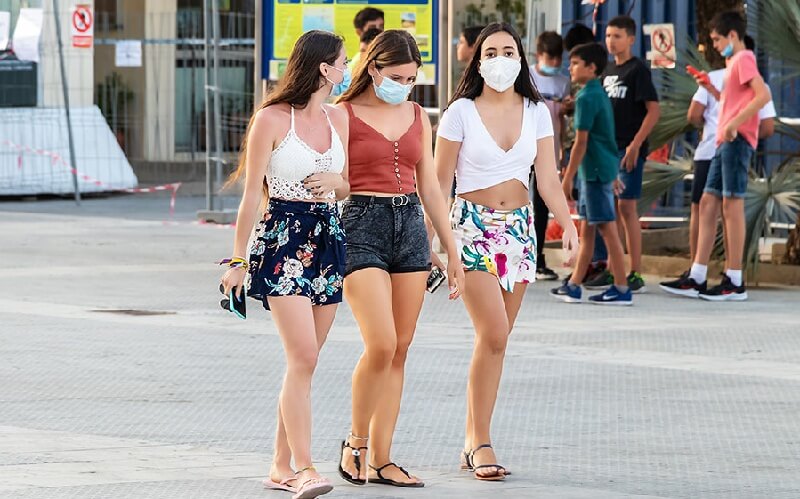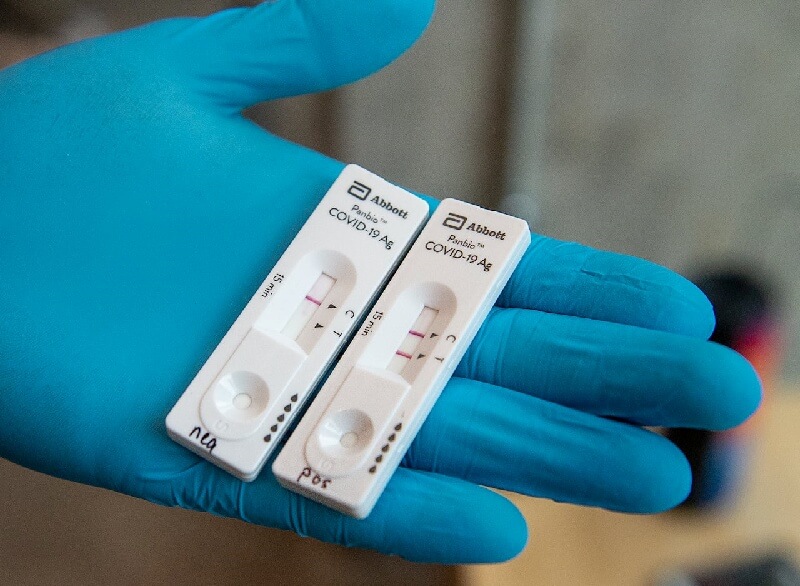 The new omicron variant of the coronavirus spreading in a big wave is a great concern for all of us. With the cases skyrocketing, many are struggling to perform antigen tests or PCRs in their health centers and at times it is even difficult to find a self-diagnosis test in pharmacies. Many who are covered by the private health insurance in Spain do ask a question: How does the private insurance company cover them against the coronavirus?
The new omicron variant of the coronavirus spreading in a big wave is a great concern for all of us. With the cases skyrocketing, many are struggling to perform antigen tests or PCRs in their health centers and at times it is even difficult to find a self-diagnosis test in pharmacies. Many who are covered by the private health insurance in Spain do ask a question: How does the private insurance company cover them against the coronavirus?
What coverage for coronavirus do insurers offer?
Although initially pandemics (such as this one due to coronavirus) are excluded from health insurance, private insurers serve all their insured who have covid-19, in collaboration with public health. Therefore, patients who show symptoms and believe they may be infected with this disease can call their private insurance for care. In these cases, the doctor can request a covid test to find out if he is suffering from this pathology, but how do the different insurers cover covid-19?
How is Covid-19 covered by DKV?
DKV will attend to its private clients with coronavirus symptoms according to the established protocols, carrying out tests to detect the disease if considered by a physician. Any insured who has symptoms of covid-19 can call DKV at 976 991 199, or contact the insurer through the medical chat of the I want to take care of myself more app. The authorisation for a PCR test when also prescribed by a doctor can be requested by telephone or WhatsApp +34960160602. If hospitalization is recommended, the patient will be referred to a public hospital, although you can obtain coverage at a DKV center for further treatment.
Asisa
Asisa is another of the insurers that will cover covid-19 in its health policy, always following the protocols and instructions of public health institutions. Therefore, Asisa makes its emergency telephone number available to those with symptoms of coronavirus: 900 900 118. However, with respect to the tests for covid-19, Asisa makes it clear that, in principle, they will not be carried out if they are not presented symptoms and that, in any case, a medical prescription is necessary.
Asefa
Asefa medical insurance performs coronavirus tests in these cases: hospitalized patients with symptoms, compatible with the coronavirus and those clients who are going to undergo any surgical intervention, delivery, cesarean sections, or invasive diagnostic procedures.
Testing for covid in Adeslas
Regarding its coverage for coronavirus, Adeslas will cover tests for covid-19 PCR and antigen testing. This coverage will be available to people insured by Adeslas who have symptoms compatible with the disease. Of course, for this the patient must present the prescription of a doctor who has already assessed it.
AXA
AXA recommends their clients with symptoms of covid-19 not to go to their health centers, but to first contact the public service that was set up their autonomous community. Regarding the tests for detecting the coronavirus, AXA performs the PCR tests in case of symptoms and with a medical prescription.
What test for covid-19 can you do with your private insurance?
As we have already seen, private health providers not only offer coverage for covid-19, but also give their policyholders the possibility of undergoing a coronavirus test. To determine if you suffer or have suffered from the coronavirus, there are two fundamental types of tests:
PCR
PCR tests, detect the presence of genetic material of a pathogen using a biological sample, taken from the patient’s nostrils or throat. In the case of the coronavirus, this material is an RNA molecule. It is the most reliable test, with an efficiency of almost 100% and capable of detecting the virus in the initial stages; although it is the most expensive and the one that takes the longest to give the result. PCRs are applied when COVID-19 is suspected, and they work in both symptomatic and asymptomatic patients. If the PCR shows a positive result, the presence of the virus is diagnosed. If you test negative, but there is a strong clinical suspicion for COVID-19, the test may be repeated.
Antigen test
 Like PCR, antigen tests are applied to find out if a patient is infected, since they detect virus proteins while the infection is taking place. These tests are performed through a nasal or saliva sample and offer the result in a matter of about 10-15 minutes. They are more effective at the time of the highest viral load: that is, with the onset of symptoms, when the disease is most contagious. They are indicated for patients who present with symptoms in the first 7 days of infection. During the last few months, more sophisticated antigen test models have been developed that offer greater precision, although they still do not reach the efficiency of PCR. Currently, they are used as a complementary screening tool to PCR that helps speed up virus detection, with approximately 80% sensitivity and 97% specificity. It should be remembered that the sensitivity of the test refers to the ability to detect the presence of SARS-CoV-2, while the specificity refers to the ability to recognize its absence.
Like PCR, antigen tests are applied to find out if a patient is infected, since they detect virus proteins while the infection is taking place. These tests are performed through a nasal or saliva sample and offer the result in a matter of about 10-15 minutes. They are more effective at the time of the highest viral load: that is, with the onset of symptoms, when the disease is most contagious. They are indicated for patients who present with symptoms in the first 7 days of infection. During the last few months, more sophisticated antigen test models have been developed that offer greater precision, although they still do not reach the efficiency of PCR. Currently, they are used as a complementary screening tool to PCR that helps speed up virus detection, with approximately 80% sensitivity and 97% specificity. It should be remembered that the sensitivity of the test refers to the ability to detect the presence of SARS-CoV-2, while the specificity refers to the ability to recognize its absence.
Antibody test
Antibody tests, unlike the previous ones, are used to detect if a person has been infected by the virus and has developed defenses, and if the infection is still active or not. Although it is not used as a definitive diagnosis, it is useful to know if a patient has been in contact with the virus or to see the evolution of the disease in confirmed cases.
There are two types of serological antibody detection tests: those for self-diagnosis and those for laboratory analysis.
In both, the presence of IgM immunoglobulins (which appear between 7 and 10 days after contact with the virus) and IgG (which appear between 10 and 15 days later) are analyzed. A positive IgM indicates an active infection, while a positive IgG means that the infection is over. If both are positive, it means that the infection is active, but in an intermediate phase.
If both are negative, it means that there has been no contact with the virus. However, on occasions, it may be that the person has been in contact with the virus, but that his immune response has been different and that, instead of developing antibodies, he has cellular immunity. This occurs when the immune system generates cytotoxic cells that attack cells infected by the virus.
Will private insurance cover a test to know I have passed Covid?
As a general rule, insurers do not cover this type of test, which, like the tests to find out if you are suffering from coronavirus at that time, must have a medical prescription.
What to do if I believe I may have coronavirus?
The first thing you should do if you begin to notice symptoms of covid-19 (fever, fatigue, dry cough or difficulty breathing) or have been in contact with a person who has tested positive is to contact the health authorities or your health insurance provider. Remember that to attend to emergencies due to coronavirus and each autonomous community has enabled a special phone number:
Information telephone numbers on the covid-19 of the autonomous communities
Andalusia: 955 54 50 60
Aragon: 061
Principality of Asturias: 900 878 232 / 984 100 400
Balearic Islands: 902 079 079 / 971 473 079. The 061 is only for emergencies.
Canary Islands: 900 11 20 61
Cantabria: 900 612 112
Castile and León: 900 222 000
Castilla-La Mancha: 900 122 112
Catalonia: 061
Valencian Community: 900 300 555
Extremadura: 112
Galicia: 900 400 116
Community of Madrid: 900 102 112
Region of Murcia: 900 121 212
Foral Community of Navarra: 948 290 290
Basque Country: 900 203 050
La Rioja: 941 298 333
Ceuta: 900 720 692
Melilla: 112
What if I am tested positive for Covid?
After testing positive for coronavirus, there are two options: if you are a patient at risk and are in serious condition, you will be isolated in the appropriate medical center, whether public or private. However, it is possible that the doctor will call you and simply recommend home isolation and avoid contact with other people, as well as the prescription of an antiviral to mitigate the symptoms. If this is your case, you will also have to be isolated in your home, avoiding contact with cohabiting people and carrying out a confinement of about 10 days (although the autonomous communities and Health are studying leaving the quarantine in seven days). Also, remember that if you are vaccinated and have had close contact, you no longer need to keep this quarantine. Above all, do not panic and follow the instructions provided by the professional who treated you to the letter.

Leave a Reply